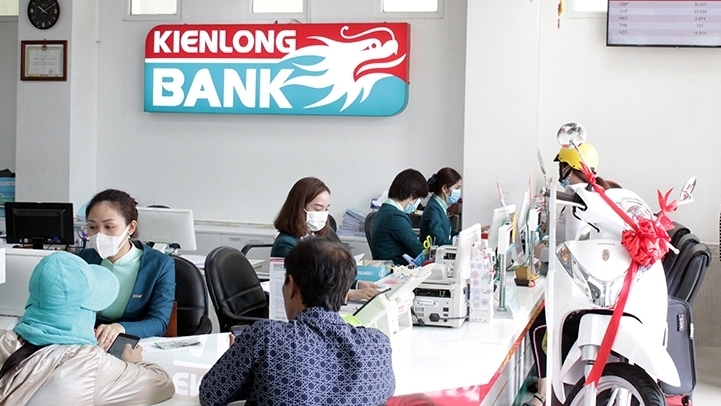Banking sector implements various solutions to support customers
ABO/NDO – The Governor of the State Bank of Vietnam (SBV) has consistently urged the entire banking system to carry out urgent solutions to prevent and fight against the COVID-19 epidemic amid the new and unpredictable development of the disease. The banking sector has also implemented a number of solutions to ease the difficulties on enterprises and people affected by the epidemic including reducing interest rates, rescheduling debt payment deadlines, and exempting and lowering payment fees.
 |
| Customers at a transaction counter of Kienlongbank. |
* Creating favourable legal corridor
According to SBV Deputy Governor Dao Minh Tu, since the outbreak of the COVID-19, credit institutions have been proactively and responsibly taking drastic measures to mitigate the impact of the epidemic whilst sharing difficulties with enterprises.
The SBV has recently issued Circular 01/2020that allows credit institutions and branches of foreign banks to reschedule debt payment deadlines and exempt and reduce interest rates and fees for enterprises affected by the COVID-19 epidemic.
"The most important element of Circular 01 is to create conditions for enterprises to continue to have capital, through bank loans combined with their own capital, to overcome difficulties and continue their production and business activities," Deputy Governor Dao Minh Tu stressed.
Nguyen Thu Thuy, owner of a company specialising in vehicle rental in Hanoi, said that the epidemic has forced a series of English centres to close, leading to a sharp reduction in tenants (mostly English teachers) in addition to the cancellation of a large number of tours. Thus, the company’s revenue has fallen by 50%, Thuy noted.
“Despite the declining revenue, the company has to maintain salaries for its employees and pay banking interest rates while we do not know when we will resume business as normal. Therefore, I hope banks will consider extending debts for enterprises at this time,” Thuy added.
According to the provisions of the Circular 01, the SBV will create a most favourable mechanism for credit institutions to proactively handle and reschedule debts for customers.
"However, the preferential policy must ensure the support of the right subjects to avoid abuse and self-interest from both enterprises and commercial banks,” Deputy Governor Dao Minh Tu noted.
The building of the circular aims to create favourable legal conditions for credit institutions to coordinate with borrowers to consider support for borrowers affected by the epidemic. At the same time, the new circular will clarify the responsibilities of both credit institutions and borrowers when implementing the support policies to ensure they benefit the right subjects.
Nguyen Trong Du, deputy chief inspector of the SBV’s Banking Inspection and Supervision Agency, said that the circular also helps credit institutions have a legal framework to continue provide new loans and helps themselves in the implementation of risk provisions.
* Providing more capital, reducing interest rates and fees
It can be seen that the COVID-19 epidemic has become more complicated on a global scale, directly affecting enterprises, particularly those in areas of import-export, tourism, transportation, agricultural and fishery production, industrial production, electronics, footwear, garments and textiles.
According to a preliminary assessment from the SBV, about VND926 trillion (US$39.85 billion) in debts affected by the epidemic are unable to be paid as scheduled, accounting for over 11% of total outstanding loans.
SBV Director of Credit Department Nguyen Quoc Hung said that since the outbreak of the epidemic, the SBV has received many documents from the Transport Association, the Leather and Footwear Association, the Cassava Association, the Coffee Association, the Young Business Association, the Vietnam Textile and Garment Group, the Cement Association, and non-public educational institutions, suggesting the removal of difficulties for enterprises.
Hung noted that right after the Government’s announcement of the epidemic, the SBV directed banks’ branches and transaction offices to actively grasp the production and business scenario and the extent of their losses to apply timely measures to support and remove difficulties for customers.
As a result, credit institutions have considered the restructuring of loans worth VND21.7 trillion and have exempted and reduced over VND350 billion in interest rates for 8,000 customers.
In addition, banks are also considering a reduction in interest rates for more than 34,350 customers with total loans of VND185 trillion.
Credit institutions have continued to complete new lending arrangements for over 5,490 customers with total expected loans of about VND24 trillion.
Many banks have also reduced or eliminate fees for banking services. The National Credit Information Centre (CIC) has also reduced fees for credit information services to help credit institutions lower costs and interest rates, thereby indirectly improving people's access to credit.
In the future, the SBV will continue to monitor the impact of the epidemic and implement executive measures while requiring credit institutions to strictly follow Circular 01 to support enterprises. Credit institutions have registered to provide a loan of VND285 trillion, showing that the banking sector is ready to supply enough capital for the economy both during and after the epidemic.
Credit institutions have also committed to provide loans at annual interest rates of 0.5 to 1% less than the current interest rates. However, the SBV noted that this is not a policy credit package, so credit institutions will have to balance their financial capacity and adjust interest rates accordingly.
(Source: NDO)
 về đầu trang
về đầu trang






